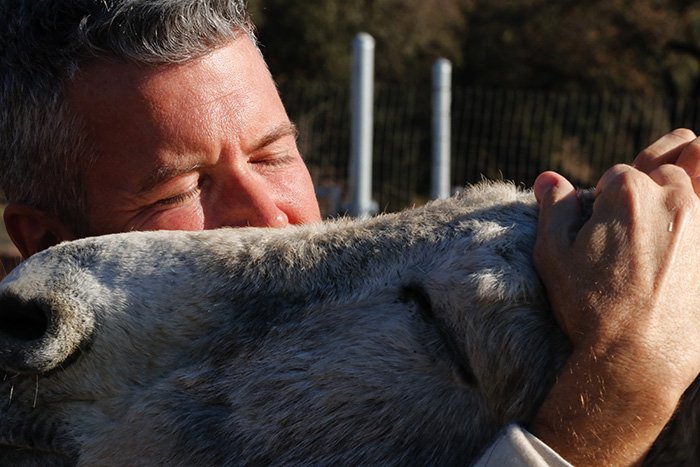
The seasonal legend is that the carpenter went door to door in Bethlehem looking for lodging while his very pregnant young wife was carried by an ass. Thirty-three years later, that grown child rode a donkey into Jerusalem to culminate his ministry. Whatever one may think of these stories, the fact that donkeys may now be an endangered species is alarming.
Donkeys? The butt of many a joke, donkeys have nonetheless been part of human history for millennia, having been domesticated in Africa as many as 7,000 years ago and used as work animals ever since. The scientific name is Equus asinus, hence its common name (donkey is a relatively modern name, quite possibly used because the term “ass” is troubling for some). But as people developed machine technology to plow, hoe, reap and bear, the common ass has become somewhat irrelevant.
But as with bears, tigers, rhinoceros and pangolin, donkeys are among the species being illegally slaughtered worldwide to supply raw material in Traditional Chinese Medicine (TCM). The “valued” portion of the donkey is its hide, from which a gelatin called ejiao is extracted.
Worldwide specialists of TCM often focus on herbal or physical remedies, but many practitioners in China and Vietnam rely on a supply of ejiao, which can only be replenished by the slaughter of donkeys. It is used in edibles, tonics and face creams, and prescribed for all sorts of ailments. Similarly, deer antlers are the base for many TCM concoctions as well.
Though ejiao’s use has been around for centuries, its modern popularity was boosted by a 2012 Chinese TV melodrama which showed ejiao used to promote fertility. One of the world’s largest ejiao producers paid for its products to be placed in the scripts, and ejiao appeared in multiple episodes over the four months the show aired in Hong Kong.
Now, it is estimated that 4.8 million donkey hides a year are taken to satisfy annual demand for ejiao, according to a recent report from the Donkey Sanctuary (thedonkeysanctuary.org.uk). At its current pace, the global donkey population of 44 million could be cut in half over the next five years, the report warns. As China’s donkey population plummets, a global trade in illegal donkeys—including livestock auctions in the U.S., where donkeys are purchased by the pound and taken to “kill pens” in Mexico for slaughter—has expanded. It’s no longer a joke, if it ever was.
But as with many of the world’s apparently insurmountable problems, the solution can begin in one’s own backyard.

Animal Rescue
Laura Somers and her husband, John, live on a ranch about a mile from Healdsburg, up a narrow road off Dry Creek. Their two children are grown now, and his mother lives up the road. There are vineyards on the property, and a creek running through it where coyotes pass through.
Last year, they thought of getting horses to graze the land. But when Somers volunteered at a donkey sanctuary called Oscar’s Place in Hopland, just over the county line into Mendocino, she was transformed by the steady affection and companionable presence of the donkeys.
Two in particular were Olive and Poppy. She would spend hours at a time with them, and a mutual bond formed. “I only wanted two, but one of the girls that I fell in love with there was pregnant,” she said.
Before the year was over, Somers adopted three donkeys—Poppy gave birth to Winnie—and added them to her ranch’s modest menagerie in October 2021.
“There was a donkey in the neighborhood when I was little named Romeo, and I just loved him,” she told the Tribune. “My kids are grown, so I thought, let’s have some donkeys. So we started looking, and the only thing we could find was the Bureau of Land Management (BLM), which is just a frightening organization.”
There are about 27 million acres of public land in the West, particularly in the mountain states, where wild horses and donkeys range, and the BLM manages that land through a program called the Wild Horse and Burro Program. But every couple years, the BLM decides that there are “too many” of these equine residents.
Federal roundups, aided by trucks, helicopters and drones, winnow the herd by hundreds if not thousands of animals, horses and donkeys both. “To prevent overpopulation and overgrazing, the BLM gathers excess animals and offers them for adoption or sale to a good home,” reads the BLM website on the program.
The fate of the captured wild horses has become something of a popular cause; many of them can find adoption, as the image of the wild mustang is romantic and compelling. But donkeys? Not so much.
Donkey King
Ron King, a former media executive, runs Oscar’s Place. He has an abundance of charisma, confidence and access to cash. Most of it is his, from a high-rolling career in publishing at Time Inc., but the Hopland property belongs to modern art dealer Philip Selway. Selway bought the property to start a farm animals’ sanctuary, but when that didn’t work out, he asked King to move up there and handle the sale.
The 75-acre property is off a small highway connecting Hopland to Lake County, a dirt mile through vineyards and oak woodlands. It’s open by appointment for prospective sponsors of a donkey, either through a donation or adoption. Adoption is a lifetime commitment; most applicants are not accepted.
There are three main pens, a barn with medical facilities, paddocks and fields. Donkeys are everywhere.
“Most of the ancient global cities were built on the backs of donkeys,” said King, a fit hazel-eyed man in his 50s, his thick hair cropped short. “Before we had tractors, donkeys did that work. Now they’re not needed anymore, and they have nobody speaking up for them.”
Inside the pen, he walked up to one gray denizen, Viejo, his arms spread wide and low. “I wanted to speak up for somebody who didn’t have somebody speaking up for them,” he said softly. “And then the fact they can love you back was very appealing to me.”
The two embraced, the donkey’s large head resting on King’s shoulders, and their eyes closed. Time passed. It’s difficult to say who needed the hug more.
Road to Redemption
King’s story is at least as interesting as the 96 donkeys he now shelters. He had a challenging youth growing up in a rigid religious family in the South, and got into trouble with the law and drugs before he turned his life around in his 20s. He became interested in the world of fashion and in publishing, and over a 20-year career became influential in the industry, as a vice president at Time Inc., with oversight of the InStyle, Southern Living, Sunset and Essence magazines.
But in 2017, Time Inc. was sold to Meredith in a $2.8 billion deal, and King took a retirement package. He knocked around a bit, doing media consulting, until in 2020 when his friend Selway asked him to help sell the 75-acre ranch in Hopland. King went to stay there for a few weeks—and discovered something he didn’t know he had been missing.
Not long after arriving at the ranch, while hiking over the property, the wired media tech exec found himself unplugged. “I had no thoughts in my head, except these beautiful surroundings. It was the first time I felt serenity in 20 years,” he told CBS Mornings.
He later came across a TikTok video of a woman rescuing donkeys, and began to research the reasons why. In so doing, he stumbled upon a global calamity in the making—the wholesale slaughter of donkeys to provide hides for traditional medicine.
Suddenly the door opened. The property was taken off the market. Selway’s idea of a farm animal sanctuary focused into Oscar’s Place Donkey Sanctuary and Adoption Center, and Ron King began a new life as a protector of donkeys.
“The only way to help a donkey that’s been abused emotionally recover is to love it back to health,” he said. Of the donkeys at Oscar’s Place now, the older ones have very probably been abused over their lives—donkeys can live 40 years. Some are more cautious than others, but with the patient care and love that King, his volunteers and employees show for the animals, a slow recovery comes to most of them.
“Donkeys have different brains than horses; the limbic system is more well developed,” said King as he caressed Viejo’s neck. “They’re not only very intelligent, but they have a lot of emotional intelligence. They’re like big loving dogs.”
In less than two years, King has become one of the biggest advocates for donkeys, and with his media connections he’s been able to get profiles on Oscar’s Place on everything from CBS Mornings to Oprah to USA Today and the Washington Post.
“We are all on our own path of redemption of some sort,” said King. “And this is a sanctuary for us as well.”
Support for Oscar’s Place is welcome through volunteers, donation or adoption. To learn more, visit oscarsplace.org.








